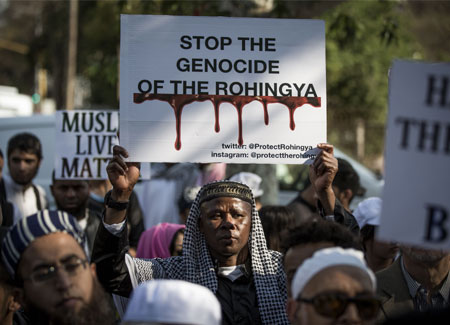
The Rohingya crisis has brought the issue of refugees to the centrestage in several countries in the region. The Myanmar government and its de facto leader, Daw Aung San Suu Kyi in particular have been strongly condemned for the violence against the Rohingya Muslim minority, which led to an exodus of refugees to Bangladesh and other countries in the region. Suu Kyi has been personally castigated by western liberals and human rights groups for her failure to address the issue.
Bangladesh has been facing the brunt of the sudden influx of over 300,000 refugees, but there are Rohingya refugees in Malaysia, Indonesia, Thailand, Saudi Arabia, Pakistan and also Sri Lanka where hardline Buddhist groups have strongly protested against them.
In India, the Rohingya issue acquired a different dimension with the government’s stated intention of identifying illegal Rohingya immigrants with a view to deport them. The move to deport refugees, who came to India following violence in earlier years, has been strongly criticised. The government has cited security concerns with respect to radicalisation of the Rohingya refugees in its response to a petition in the Supreme Court. There are reports of links between al Qaida and other foreign jihadi organisation with militant Rohingya groups.
The Myanmar government has been under tremendous international pressure over what human rights groups have described as a “scorched earth” policy. The European Union cancelled an important trade mission and the US has expressed “grave concern” and sent an envoy to Myanmar.
The Rohingya issue is a long festering problem in Myanmar of a conflict between majority Buddhists and Muslim minority in northern Rakhine state, one of its least developed states. The Rohingya are labeled Bangladeshi immigrants despite their claim of having lived there for generations. They have faced institutionalised discrimination and sectarian violence over the decades. In the census of 2014, they had to be listed as Bengalis when Buddhist nationalists threatened a boycott.
A series of attacks on security posts near the Bangladesh border by Rohingya militants in October 2016 led to military crackdown. In August 2017, a militant group calling itself, Arakan Rohingya Salvation Army (ARSA) carried out coordinated attacks on 30 police posts and an army base. The attacks led to widespread violence by security forces and Buddhist mobs that forced the Rohingya to flee.
Myanmar is still a fragile democracy. Under the Myanmar Constitution drafted by the military regime, power is shared between the civilian government and the Myanmar army, the Tatmadaw. The military appoints 25 per cent of the Parliament and the regional assemblies and heads the ministries of Border and Home Affairs, Defence and police affairs. Suu Kyi has had to tread carefully as the military, not only holds the critical ministries, it is not answerable to the political leadership and has the power to dismiss the civilian government. Myanmar government does not acknowledge the term Rohingya; the Myanmar army calls them Bengalis while Suu Kyi has asked to government to refer to them as ‘Muslims of Rakhine state’. With majority sentiment in the country opposed to the Rohingya and no control over the army, Suu Kyi chose to remain silent when the attacks took place.
India had supported the Myanmar government over its Rohingya crisis during Prime Minister Narendra Modi’s visit to Myanmar earlier this month, but soon found itself at odds with the general opinion in the region. As reports of rape, killings and burning of entire villages in Rakhine state emerged and refugees poured into Bangladesh, the Modi government had to change its stance when Bangladesh conveyed its dismay over the Indian position.
India could not place its ties with Dhaka at risk by ignoring the humanitarian crisis and the immense burden on Bangladesh from housing the refugees. While External Affairs Minister Sushma Swaraj spoke to Sheikh Hasina over the phone, the ministry put out a statement, asking Myanmar to handle the refugee crisis with "restraint and maturity". The government also launched Operation Insaniyat to deliver food and aid to Bangladesh for the refugees.
India would not want to disturb its ties with Bangladesh or Myanmar, which has been supported by China in its recent crisis. The coastal Rakhine state has strategic relevance; its Sittwe port is the gateway for Chinese oil and gas pipelines leading to Kunming in China as well the starting point of India’s Kaladan multimodal transportation project linking to the northeastern states.
Suu Kyi recently promised to begin a verification process to repatriate refugees who provide evidence of their Myanmar residency along the lines of an earlier agreement with Bangladesh on repatriation of refugees. But this assurance has not placated her critics. Myanmar can only lessen international opprobrium by taking concrete steps to stop the violence in the Rakhine, allow independent observers and aid workers into the area and begin the process of repatriation.




